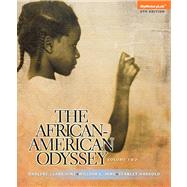A compelling story of agency, survival, struggle and triumph over adversity
More than any other text, The African-American Odyssey illuminates the central place of African-Americans in U.S. history by telling the story of what it has meant to be black in America and how African-American history is inseparably woven into the greater context of American history. From Africa to the 21st century, this book follows the long and turbulent journey of African-Americans, the rich culture they have nurtured throughout their history and the quest for freedom through which African-Americans have sought to counter oppression and racism. This text also recognizes the diversity within the African-American sphere, providing coverage of class and gender and balancing the lives of ordinary men and women with accounts of black leaders and the impact each has had on the struggle for freedom.
MyHistoryLab is an integral part of the Hine program. Key learning applications include Closer Looks, MyHistoryLibrary, and writing assessment.
A better teaching and learning experience
This program will provide a better teaching and learning experience—for you and your students. Here’s how:
- Personalize Learning– MyHistoryLab is online learning. MyHistoryLab engages students through personalized learning and helps instructors from course preparation to delivery and assessment.
- Improve Critical Thinking–Features throughout the text encourage students to think critically about the material.
- Engage Students– Features such as “Voices from the Odyssey” engage students in the material.
- Support Instructors– A full set of supplements, including MyHistoryLab, provides instructors with all the resources and support they need.
NOTE: MyHistoryLab does not come automatically packaged with this text. To purchase MyHistoryLab, please visit www.myhistorylab.com or you can purchase a ValuePack of the text + MyHistoryLab: ValuePack ISBN-10: 0205961614 / ValuePack ISBN-13: 9780205961610








